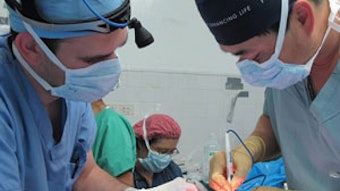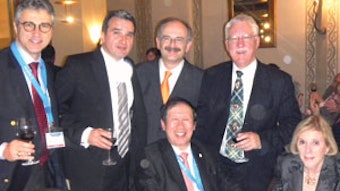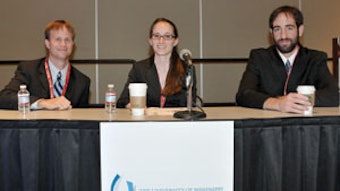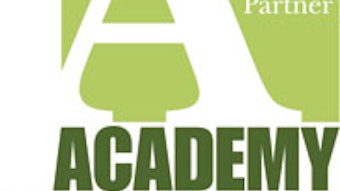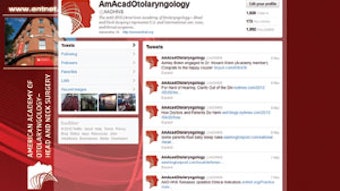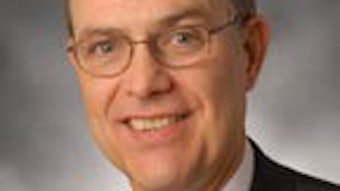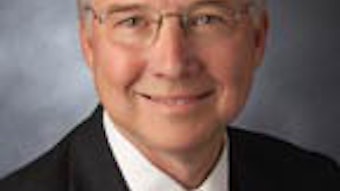Research and Quality Improvement Accomplishments
John S. Rhee, MD, MPH, AAO-HNSF Coordinator, Research and Quality It’s been a productive year for Research and Quality Improvement at the AAO-HNS and for all of our Academy member volunteers. In this issue of the Bulletin, we highlight the important developments and achievements of our collective team. Academy leadership has been extremely supportive and visionary as we react to new challenges and anticipate new developments in the realm of research and quality. Increasingly, the boundaries of clinical outcomes research, quality metrics, health policy, board certification maintenance, and reimbursement are becoming blurred and indistinct. The talent, dedication, and teamwork of our unit have been tremendous with just some of the many achievements highlighted in the paragraphs below: In March 2012, the Clinical Practice Guideline (CPG): Sudden Hearing Loss was published in Otolaryngology—Head and Neck Surgery and two clinical consensus statements were submitted for publication in late April 2012 (Appropriate Use of CT Imaging for Paranasal Sinus Disease and Tracheostomy Care). We have three CPGs under development (Improving Voice Outcomes after Thyroid Surgery, Tympanostomy Tubes in Children, and Bell’s Palsy). Guidelines continue to be of great interest to Academy membership as illustrated by being the No. 1 (Tonsillectomy in Children) and No. 2 (Indications for Polysomnography for Sleep-Disorder Breathing prior to Tonsillectomy in Children) most downloaded articles in Otolaryngology—Head and Neck Surgery during 2011. For practice-based research, three grants have been submitted since October 2011. The Creating Healthcare Excellence through Education and Research (CHEER) renewal scored well and funding is expected for an additional five years. CHEER will deploy a study testing awareness of, and barriers to, implementation of the Sudden Hearing Loss guideline. A pilot study utilizing the Surgical Consumer Assessment of Health Providers and Services (SCAHPS) was successfully completed last year and a manuscript has been submitted to the Academy journal. (Read more on p. 26.) This year the CORE Study Section reviewed a record 189 applications. Applicants were seeking $3,517,630 in research funding (up 24 percent). We are thrilled to report that 46 applicants have been awarded funding by the leadership of the participating societies and foundations totaling $777,471 (up 19 percent). Resident participation is at an all-time high within the CORE Study Section (18 percent) and we are glad to see so many young investigators eager to rub elbows with the research leaders in the field. One described the experience as “both inspirational and humbling.” The Patient Safety and Quality Improvement (PSQI) Committee continues to be prolific in generating survey and database studies that focus on areas of risk for otolaryngology-head and neck surgery. During the past year, they have completed or initiated studies in the following areas: tonsillectomy disasters, issues with tracheotomy, post-admission criteria in obstructive sleep apnea, and practitioner transitions. In addition, the committee is developing a secure web link for reporting patient safety events. Through this web link, members will be able to enter de-identified event information, which, over time, can provide PSQI with focus areas for future work of the committee. Last year, we created the Advisory Council on Quality (ACQ) to lend counsel to staff, the committees involved in the Foundation’s quality agenda, and me. The group met several times during the past year and has contributed greatly to the discussions with the Academy and the Board for preparing our members in meeting requirements of Part IV MOC. Next year, we will be engaging the group in more of the Quality Improvement strategic initiatives and seeking their expertise in some key project areas, including measure development and a small data registry project. The Outcomes Research and Evidence-Based Medicine (OREBM) Committee is developing a list of prioritized areas for future study. These are areas within otolaryngology-head and neck surgery that are most in need of future data (i.e., “evidence gaps”) to help improve evidence-based clinical decision-making. In addition, the committee has worked to identify clinical areas that may benefit from compiling and critically analyzing currently available data in the form of a systematic review or meta-analysis. Several of the OREBM members were recipients of scholarships to attend the Cochrane Collaboration Colloquium Meeting in October that will include training in advanced meta-analysis techniques. In addition, the committee is exploring ways to provide CORE grant support specifically targeted to the study of prioritized research areas for the benefit of future patients and our specialty. (Read more on p. 21.) I appreciate the opportunity to share the great work that is going on with Research and Quality Improvement and the committees it supports. Please join me in thanking the many leaders and participants on our team. Their dedication and volunteerism are exemplary, and I hope you will continue to support us and provide feedback as we work together toward our collective future.
John S. Rhee, MD, MPH, AAO-HNSF Coordinator, Research and Quality
It’s been a productive year for Research and Quality Improvement at the AAO-HNS and for all of our Academy member volunteers. In this issue of the Bulletin, we highlight the important developments and achievements of our collective team. Academy leadership has been extremely supportive and visionary as we react to new challenges and anticipate new developments in the realm of research and quality.
Increasingly, the boundaries of clinical outcomes research, quality metrics, health policy, board certification maintenance, and reimbursement are becoming blurred and indistinct. The talent, dedication, and teamwork of our unit have been tremendous with just some of the many achievements highlighted in the paragraphs below:
In March 2012, the Clinical Practice Guideline (CPG): Sudden Hearing Loss was published in Otolaryngology—Head and Neck Surgery and two clinical consensus statements were submitted for publication in late April 2012 (Appropriate Use of CT Imaging for Paranasal Sinus Disease and Tracheostomy Care). We have three CPGs under development (Improving Voice Outcomes after Thyroid Surgery, Tympanostomy Tubes in Children, and Bell’s Palsy). Guidelines continue to be of great interest to Academy membership as illustrated by being the No. 1 (Tonsillectomy in Children) and No. 2 (Indications for Polysomnography for Sleep-Disorder Breathing prior to Tonsillectomy in Children) most downloaded articles in Otolaryngology—Head and Neck Surgery during 2011.
For practice-based research, three grants have been submitted since October 2011. The Creating Healthcare Excellence through Education and Research (CHEER) renewal scored well and funding is expected for an additional five years. CHEER will deploy a study testing awareness of, and barriers to, implementation of the Sudden Hearing Loss guideline. A pilot study utilizing the Surgical Consumer Assessment of Health Providers and Services (SCAHPS) was successfully completed last year and a manuscript has been submitted to the Academy journal. (Read more on p. 26.)
This year the CORE Study Section reviewed a record 189 applications. Applicants were seeking $3,517,630 in research funding (up 24 percent). We are thrilled to report that 46 applicants have been awarded funding by the leadership of the participating societies and foundations totaling $777,471 (up 19 percent). Resident participation is at an all-time high within the CORE Study Section (18 percent) and we are glad to see so many young investigators eager to rub elbows with the research leaders in the field. One described the experience as “both inspirational and humbling.”
The Patient Safety and Quality Improvement (PSQI) Committee continues to be prolific in generating survey and database studies that focus on areas of risk for otolaryngology-head and neck surgery. During the past year, they have completed or initiated studies in the following areas: tonsillectomy disasters, issues with tracheotomy, post-admission criteria in obstructive sleep apnea, and practitioner transitions. In addition, the committee is developing a secure web link for reporting patient safety events. Through this web link, members will be able to enter de-identified event information, which, over time, can provide PSQI with focus areas for future work of the committee.
Last year, we created the Advisory Council on Quality (ACQ) to lend counsel to staff, the committees involved in the Foundation’s quality agenda, and me. The group met several times during the past year and has contributed greatly to the discussions with the Academy and the Board for preparing our members in meeting requirements of Part IV MOC. Next year, we will be engaging the group in more of the Quality Improvement strategic initiatives and seeking their expertise in some key project areas, including measure development and a small data registry project.
The Outcomes Research and Evidence-Based Medicine (OREBM) Committee is developing a list of prioritized areas for future study. These are areas within otolaryngology-head and neck surgery that are most in need of future data (i.e., “evidence gaps”) to help improve evidence-based clinical decision-making. In addition, the committee has worked to identify clinical areas that may benefit from compiling and critically analyzing currently available data in the form of a systematic review or meta-analysis.
Several of the OREBM members were recipients of scholarships to attend the Cochrane Collaboration Colloquium Meeting in October that will include training in advanced meta-analysis techniques. In addition, the committee is exploring ways to provide CORE grant support specifically targeted to the study of prioritized research areas for the benefit of future patients and our specialty. (Read more on p. 21.)
I appreciate the opportunity to share the great work that is going on with Research and Quality Improvement and the committees it supports. Please join me in thanking the many leaders and participants on our team. Their dedication and volunteerism are exemplary, and I hope you will continue to support us and provide feedback as we work together toward our collective future.
